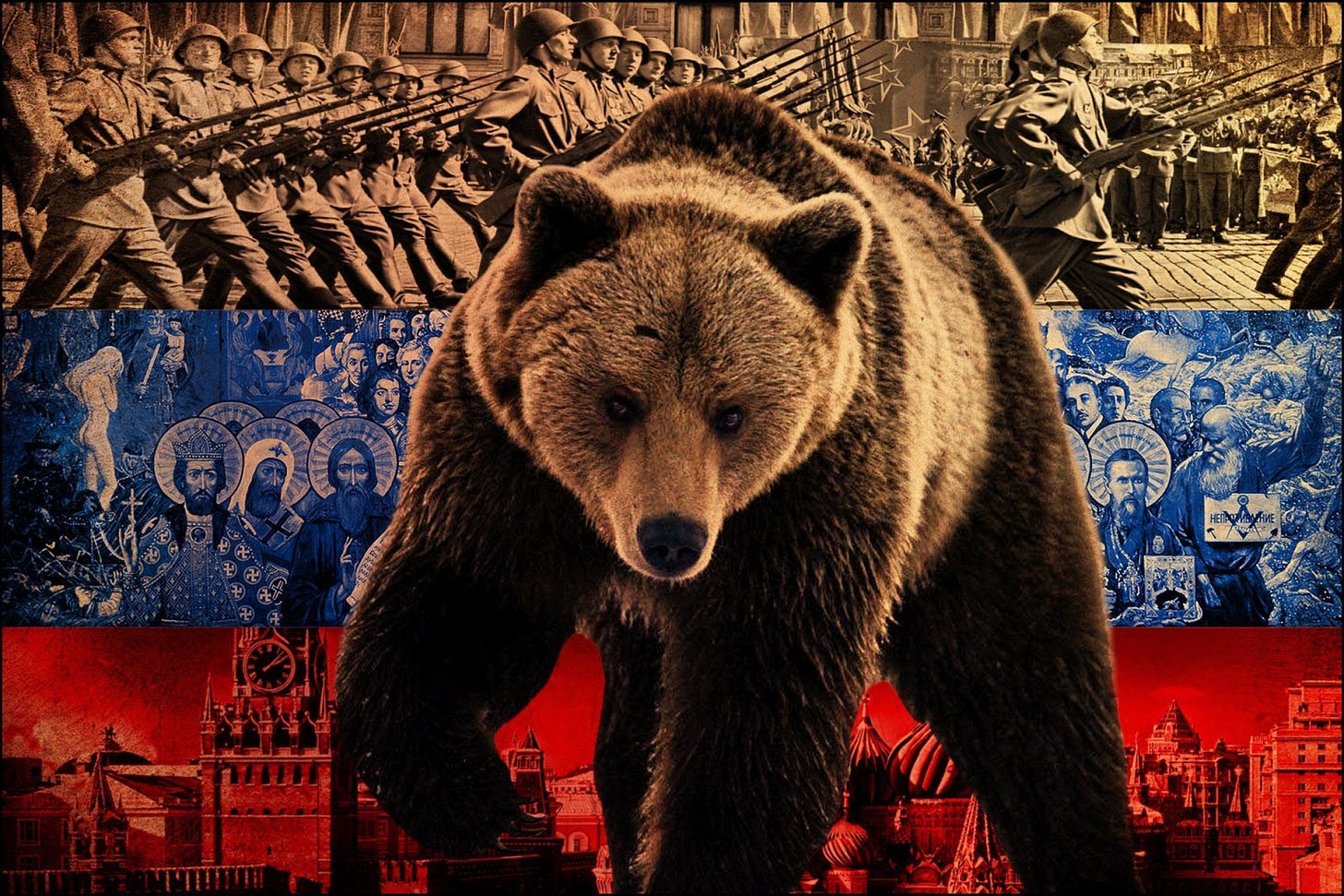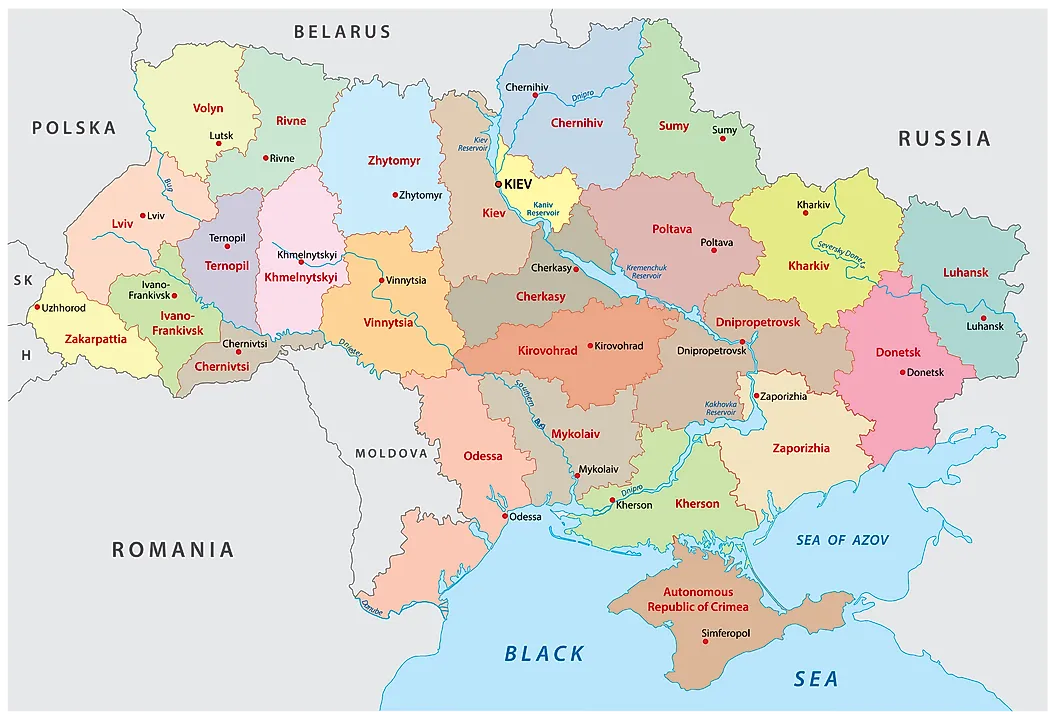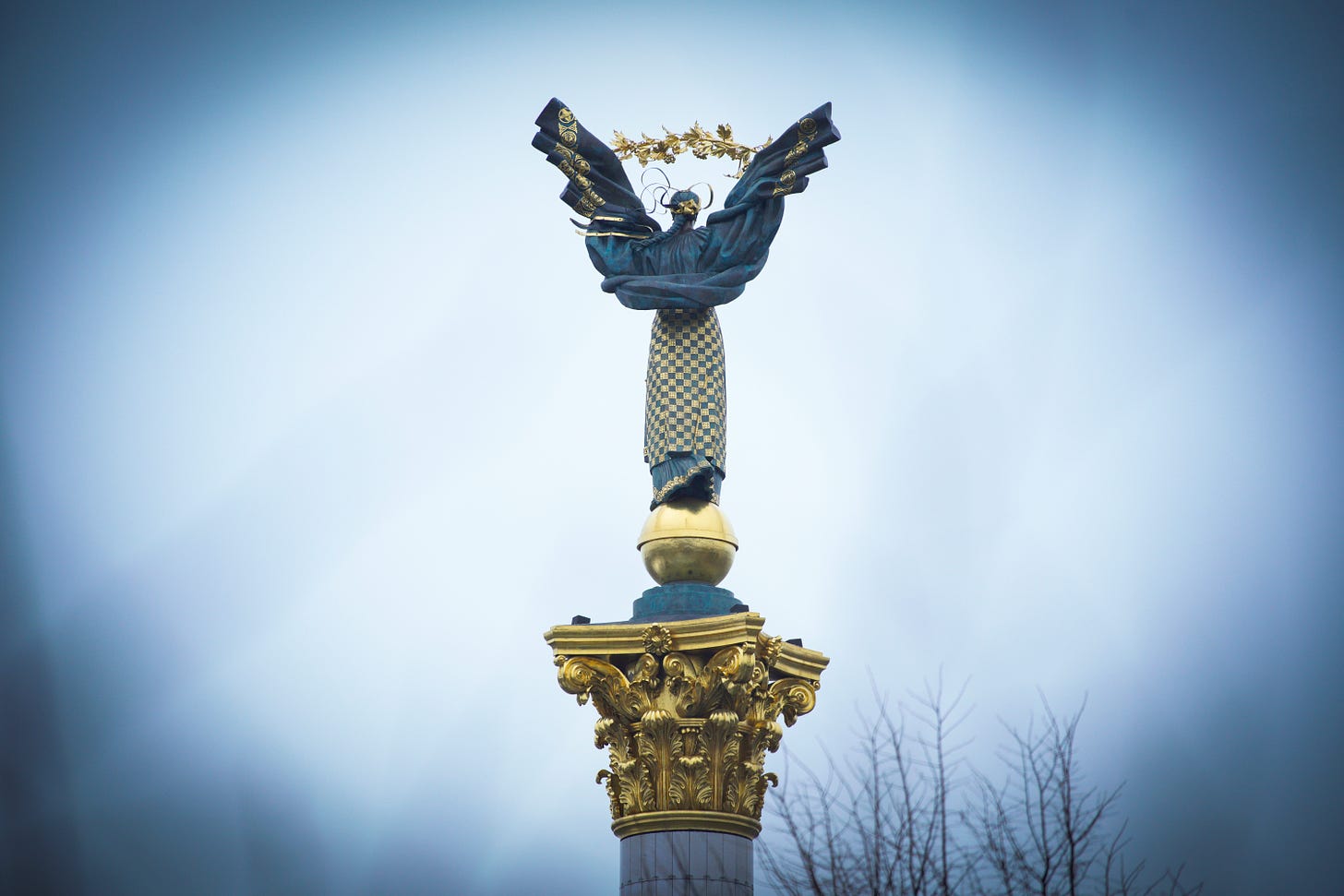Ukraine on a Knife's Edge
Things are, as usual, going to shit in Europe’s most unlucky country
Edited by David Swanson
As Russian troops embark upon what may be anything from an extension of the long and grinding war in Ukraine’s far East to a full-scale invasion, I thought I’d write a few words about the conflict. I’m not a geopolitical expert or specialist, nor, God forbid, a self-styled war pundit, but I did spend a year living in Ukraine and left in 2013, a scant two months before its last revolution in 2014; I have taken courses on its history and literature; and have endeavored, in the years following my sojourn there, to keep up with the fluctuations of its politics. What follows is a very bare primer on why and how things have gotten to this point, flavored with my own politics, which support Ukrainian sovereignty in no uncertain terms.
First: some useful sources to follow on this, for the Twitter users among you, which offer a constellation of perspectives rarely found in the New York Times: The queer Ukrainian reporter Maksym Eristavi; U.S. scholar and journalist Nina Jankowicz; Russia-based reporters Kevin Rothrock and the Kremlin-critical team at Meduza.io; and the freelance journalist Leonid Ragozin. I recommend you follow them all, for views that depart from both the State Department and Kremlin lines, and reflect greater regional expertise than you may find in many Western publications.
Second: the primary detail that grips me is a sense of déjà vu—this is a playbook Russia has used before, with parallels so direct it makes your teeth ache. In 2008, Russia went to war with the former Soviet Republic (and current independent democracy) of Georgia; the prelude then played out differently—Georgia’s president at the time, Mikhail Saakashvili, was a great deal more certain of Western military backing than the actuality bore out, and thus quite a bit more foolhardy than his Ukrainian contemporary counterpart Volodymyr Zelensky. But some priors are breathtakingly similar. In that conflict, the provinces of Abkhazia and South Ossetia—historically fractious regions that had been subject to outbreaks of violence by and against the central government of Georgia—found themselves subject to a sudden recognition of their status as independent states by Russia, and by no one else. Purported maltreatment of those regions’ citizens served, for Putin, as a pretext for war, under the guise of protecting these innocents with the power of the Russian military.
This was quite a large bite to take out of Georgia’s sovereign territory, one hedged by the extraordinarily brazen propaganda only an autocracy can summon: the primary claim was that Russian military incursions were a blow against potential genocide. Today, Abkhazia and South Ossetia exist in a fairly nebulous condition all too common in Russia’s sphere of influence: Georgia’s government considers them autonomous regions within its territory; Russia’s government considers them client states and proxies in the region; periodic skirmishes over precise borders have broken out over the last decade; both regions rely on the Kremlin for a plurality of their budgets.
Yesterday, Vladimir Putin, in a very long and very martial speech that served, at least in part, as a history lesson in Russian denigration of Ukrainian sovereignty, abruptly recognized the independence of two fractious regions in Ukraine’s far east: the self-declared republics of Donetsk and Luhansk, both of which have been subject to Kremlin meddling for the duration of the long, grinding war in the Eastern Ukrainian province of Donbas. Mentions of the ruthlessness of Ukraine’s government, an incipient genocide against Russian speakers, and the necessity of intervention for the good of innocents—handily accompanied by the aforementioned military intervention, forthcoming in real time—figured prominently in Putin’s speech. The Russia-aligned separatists in Donetsk and Luhansk have long enjoyed semi-covert Russian military aid, and the war has been going on more or less continuously since 2014, at disastrous cost in life (some 14,000 people have died in the conflict) and even more in displacement, economic ruin, and destruction of a region that was never exactly a bastion of prosperity. The recognition of Donetsk and Luhansk and the situation in Abkhazia and South Ossetia have a breathtakingly “stop me if you’ve heard this before” familiarity; indeed, the decrees in 2008 and the 2022 decrees contain a surprising amount of identical language.
This may seem hubristic; in fact, it is, a brazen assertion of imperial violence. But there is ample reason for Russia to expect no more than a few toothless sanctions, if any are imposed at all. No one stopped them in Georgia in 2008. No one stopped them in 2014 after the daylight theft of the Crimean peninsula under the guise of a transparently rigged referendum. No one has stopped them over years and years of a grinding and hideous war in the Donbass. For that matter, no one said shit when they flattened Chechnya after that province attempted to declare its independence from the Russian Federation in the nineties. There is a robustly-demonstrated Western tradition, in recent decades, of broadly viewing any former Soviet country or territory as essentially Russia’s business. Why should anything be different now, despite the perfunctory diplomatic shufflings of the U.S., Germany, and France? What would the consequences of any further involvement be? Perhaps it’s neater to abandon Ukraine to its fate, whether it’s a little incursion or the big one, one that would see a free Kyiv fall back again under the big boot of empire, after just a few years of hard-won freedom.
Here’s my little descent into amateur Kremlinology, regarding a theory substantiated mostly by thin knowledge of history and current events and little else—caveat lector. Ukraine and Russia have had an itchy relationship for the past century or so: wedged between Russia and the West, Ukraine is a nearly-Texas-sized territory with immense tracts of arable land that has seen more horrifying shit than any country should—invasion, famine, invasion, war, invasion, etc., in seldom-interrupted stretches for the entirety of the past century—it’s been occupied by four separate empires since the 1700s, including the Russians, the Third Reich, the Ottoman Empire, and the Austro-Hungarian Empire, which is downright impressive.
Ukraine is also, in some sense, the lost jewel in the tsar’s crown, a plum that Russia has always viewed as ripe for the plucking, in no small part for having the misfortune of sharing a gigantic land border with a very hungry empire, never a comfortable position to be in. Ukraine was a key province in the Russian empire, which suppressed the Ukrainian language quite brutally in a futile effort to curtail the boiling-up of nationalism. A century ago, the Red Army’s invasion of Ukraine was fought bitterly by fascist ultranationalists, tsarists, an anarchist peasant army under the charismatic leadership of one Nestor Makhno, and a dizzying array of short-lived provisional governments. Seventy years later, the breakaway of Ukraine from the Soviet Union following the collapse of the Iron Curtain served as the shattering of the keystone holding up the whole rotting edifice, and the dissolution of the Soviets followed with breathtaking speed.
The Sword and the Sandwich is a newsletter about deadly serious extremism and equally serious sandwiches. Please consider supporting this work with a paid subscription:
Putin, as the autocrat of Russia, views himself as heir to both these empires—the tsarist and the Soviet—though he embraces neither legacy with particular gusto. (The wonderful novel Day of the Oprichnik, by Vladimir Sorokin, luridly and rather daringly imagines a dystopian near-future Russia in which a corrupt autocrat and his cronies embrace neo-tsarism and deck themselves out Ivan the Terrible style, culminating in a drug-fueled orgy in a bathhouse; in real life, however, Putin prefers a more austere style of dress than even the most minor Romanov, although his reportedly staggering personal wealth might have made Peter the Great blush.) Putin’s relationship with the Soviet Union’s legacy is similarly uneasy; while the former KGB agent embraces nostalgia for victory in the Great Patriotic War (a.k.a WWII), Communism has been rendered an impotent political force to be scarcely acknowledged.
In the West, there’s a marked tendency to build Putin up as an impossibly shrewd figure, omnipotent, omnipresent, and capable of any number of destabilizing impulses. This is broadly true within his own borders—just ask the myriad Russian dissidents and critical journalists who have been summarily assassinated, or the intellectuals who find themselves in exile, or anyone gay—but less absolute outside of them. Yes, Russia has a fuck-ton of nukes, a fairly fine-tuned capacity for cyberwarfare, and a reasonably large army. But Putin is neither god nor titan, and is not capable of singlehandedly creating, say, domestic extremist movements, or an entire presidency, in the United States, no matter what excitable pundits have to say about it. In practical reality, despite the vastness of the Russian Federation and its babel of languages and ethnicities—from Tatars and Maris to Avars and Circassians—the GDP of the country is less than Italy’s, and the population in all that boundless expanse is less than half that of the United States. Russia has been reduced to an authoritarian petrostate, with staggering wealth inequality, relegated to a relatively minor place in world affairs. The demise of the Soviet Union, Putin once said, was the “greatest geopolitical catastrophe of the 20th century,” but this has far more to do with his view that it meant the dissolution of “historical Russia”—i.e., an enormous empire with near-total dominance over Eastern Europe—than any rose-colored view of the Bolshevik regime.
It’s perhaps the ultimate injury to a narcissistic would-be emperor for former imperial subjects to go about shucking their puppet governments—as Ukraine did in its 2014 revolution—and to proceed to hold democratic elections, let alone go about speaking their own language and teaching it and asserting independence as an actor in the world. The natural inclination of a would-be emperor, one who sees the “historic” and true Russia as extending far beyond its present borders, is simply to reach out and take what he views as his—no matter how many people have to die for it to be so. Like a prized toy to be reclaimed, if the toy was full of forty-four million people. And perhaps he's right. No one has stopped him in a similar course before. Ukraine is, as ever, balanced on the knife’s edge between competing empires, its borderland status making it both prize and threat at once.
I cannot pretend to predict what will happen over the next few days, but I do have some hope, in the people of Ukraine if no one else: after all, this is a nation whose national anthem is “Ukraine Has Not Yet Perished,” which indicates both an appropriate realism and a degree of scrappy survival instinct. And to that I cling, with a heart that loves the catalpa trees of Odessa, and the soaring angel in Kyiv’s Independence Square, and the safflower fields outside Lviv, and the Austrian coffee of the Carpathians, and the old Polish castles crumbling gently into the rich earth of the West, and even the stark industrial beauty of Kharkiv and Dniepropetrovsk—Ukraine in all its seasons and corners. In the last months before Crimea was invaded, I, unknowing, spent a week in Yalta, drinking the good cheap wine in abundance, walking past the elaborate fronts of nineteenth-century sanatoria, and watching the Black Sea lap hungrily against the harbor walls. Now it is in another country, taken by force, and with less freedom, and I hope for better things for the rest of the country I still love.









Good article. Keep them coming. We need new voices, and other perspectives ! Vilunya